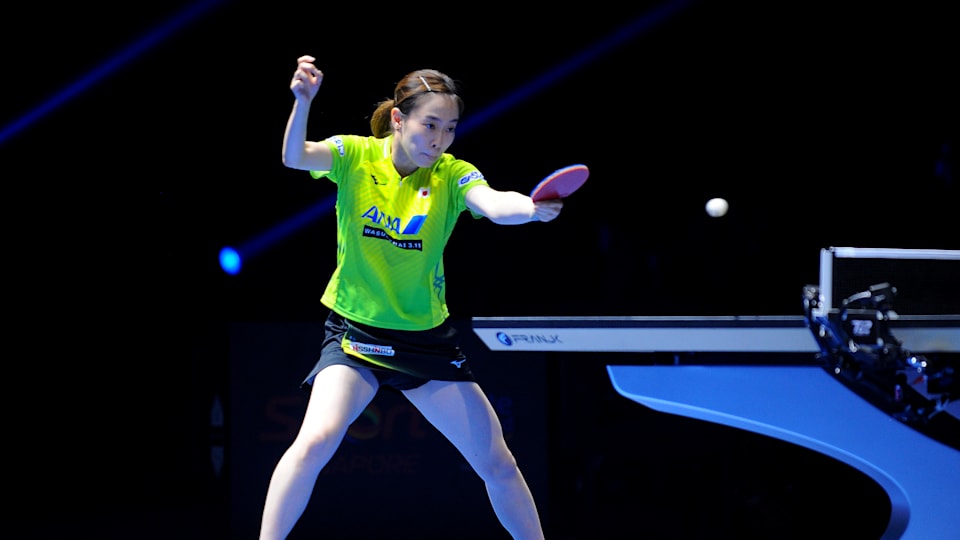Why home Games could be last chance for Ishikawa Kasumi to win singles medal
The Japanese table tennis player has two team Olympic medals, but the country has never won a singles medal in the sport. Tokyo could be Ishikawa's last chance with younger players coming through.

Winning an Olympic medal is not easy. It's even harder in table tennis, given the domination of the top Chinese players in the sport.
It's with this in mind that Ishikawa Kasumi heads into a home Games in Tokyo next year looking for her first singles medal in three attempts.
Already 27, the Japanese star is one of the best players never to have won a singles medal at either the Olympic Games or World Championships.
Ishikawa ranks "Winning team medals at London 2012 and Rio 2016 and the Mixed Doubles gold medal at the 2017 World Championships" as her career highlights, but can she emulate that success without a partner?
And with younger Japanese stars like Ito Mima – the current world number two – and Hirano Miu staking a claim for themselves, this may be Ishikawa's last chance to make her mark – on the Olympic stage at least.
Asian Cup medallist at 14
The two-time Olympic medallist (she won team silver at London 2012 and team bronze at Rio 2016) – was a table tennis prodigy at a young age.
Ishikawa's whole family played the sport – her mother being a former national player and also her first coach – and the Yamaguchi native took it up when she was very young, winning four consecutive junior All-Japan titles.
In 2007, still aged only 14, she was selected to represent Japan at the ITTF-ATTU Asian Cup and won bronze at the tournament in Hanoi; two years later she was competing at the World Championships on home soil in Yokohama, where she reached the quarter-finals before losing to world number one Zhang Yining.
That early exposure to top international table tennis contributed to her rapid development, sending her into the world top five before her first Olympic Games in London.
Unfazed by the attention, she made the semi-finals where eventual champion Li Xiaoxia proved too much of a match; the 19-year-old Ishikawa would go on to lose the bronze medal match to Singapore's Feng Tianwei.
However, along with Hirano Sayaka and Fukuhara Ai, Ishikawa picked up her first medal in the team event. That medal was Japan's first Olympic success in the sport since table tennis became an official event at Seoul 1988.
Documentary crew
Fast-forward four years to Rio 2016, where she suffered an upset in her first match of the competition. Having been given a bye to the third round as the fourth seed, Ishikawa was beaten in seven games by North Korea's Kim Song-i.
While Ishikawa put that disappointment behind her to help the Japanese team – now with the young Ito in place of Hirano Sayaka – claim bronze, it was yet another singles opportunity lost. Kim would go on to beat Fukuhara in the bronze medal match.
It was around this time that her achievements caught the eye of a documentary crew, filming an episode for a series following experts in different industries, from doctors to sushi makers to table tennis players.
Mixed doubles gold at the 2017 World Championships alongside Yoshimura Maharu only served to increase the hype.
"She is one of the best in terms of capabilities and achievements hence we decided to make a documentary on her," the show's director said then.
Yakiniku and bubble tea
The 27-year-old shakehand left-hander is a fluent speaker of Mandarin thanks to working with Chinese coaches. Like Fukuhara before her, she is very popular on Chinese social media – she received more than 60,000 followers on the day she started her Weibo account.
Alongside Ito and Mizutani Jun, she had a cameo role in the 2017 Japanese rom-com film Mixed Doubles, although acting may not be in her future. The paddler prefers watching movies – her favourites being The Greatest Showman (with Hugh Jackman and Zac Efron) and Crazy Rich Asians.
Like many other top athletes, Ishikawa keeps to a certain routine with her food, although she admits to having a weak spot for yakiniku (Japanese grilled beef) and tapioca drinks – more commonly known elsewhere as boba or bubble tea. Neither is she shy of showing off her cooking skills, especially Japanese-style curry.
And, while she has travelled all over the world playing competitions, there is no place quite like home.
In a short question-and-answer with the International Table Tennis Federation, Ishikawa explained why she considers hometown Yamaguchi her favourite place. "Because of the clean air – it makes me feel fresh," she said.
Last shot?
If Ishikawa misses out on a singles medal at Tokyo 2020, it's unclear if she has another chance. It could be now or never for her.
Ishikawa would be 31 by the time Paris 2024 takes place, and while she could still be playing then, with younger players coming through the Japanese system, there's no guarantee she would be picked for the 2024 Olympic team.
In the last year or so, Ishikawa has somewhat been outshone by teammate Ito. The younger player is considered a bigger threat to China's stranglehold on the sport than Ishikawa, such has been the level of Ito's play, which has seen her beat the top Chinese players.
Perhaps the attention being elsewhere might help Ishikawa's push to finally win a singles medal at a major tournament. But, with Japan being such big table tennis fans, there will likely be no place to hide when Tokyo 2020 comes around. And judging by her reaction when achieving qualification, she's definitely excited by the challenge.
